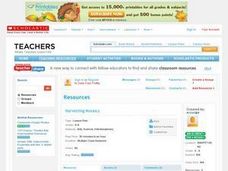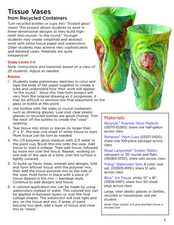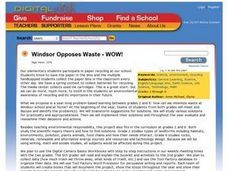Curated OER
Recycling
Students answer questions on a survey regarding their participation in ecology. They then discuss their ratings, what they never do, and think up two more additions for the list.
Curated OER
Harvesting Mosaics
Students use pieces of farm pictures to investigate the elements of art. In this farm art lesson, students use pieces of pictures to create an original artwork. Students use the Internet to find images. Students create a...
Curated OER
Junk Mail Airmail
Third graders explore how to make a contribution to end the junk mail problem. In this junk mail lesson students collect junk mail, identify the resources used and construct junk mail airplanes.
Curated OER
Pollution
Young ecologists investigate some of the many ways that human activities adversely affect the environment. After identifying the main types of pollution (air, water, soil), 3rd graders fill in a Venn Diagram by pasting cut-out pictures...
Curated OER
Reuse and Respect!
Learners examine the concept of reusing trash to save the environment. For this environment lesson, students examine the definition of the word reuse, and apply it by finding ways to reuse trash in their school. They talk about what...
Curated OER
Halloween Literature Unit: Pumpkin Patch Unit Project
Students simulate an agriculture project. In this sequencing lesson plan, students observe their classroom pumpkin patch, make journal entries, and predict how the pumpkins will grow. They discuss as a class how to keep their pumpkins...
Curated OER
Who in the World Is....?
Young scholars access how to scan the newspaper for relevant information. They become acquainted with the sections of the newspaper. Students practice summarizing what they have learned.
Curated OER
Mexican Metal Tooling
Metal work can be a wonderful way to expose learners to Mexican folk art. This resource provides all the necessary steps for creating Mexican metal tooling with your art class. Images, web links, recommended books and products make...
Curated OER
Mass vs. Weight
Why do you weigh more in space? Each individual in your class explores this question and others as they determine the mass and weight of different objects using two types of scales. They perform conversions and discuss their...
Curated OER
Self-Promotion
Students create "assemblage boxes" displaying representations of themselves and the importance they see in their own lives. This middle school level lesson emphasizes the art of American artist Sarah Goodridge who has success in the...
Curated OER
Clowning Around: Drawing
Kids create a clown out of shapes. They work to show emotions while practicing their drawing skills. Pupils use circles, triangles, squares, oil pastels, and their imagination to draw, color, and decorate a sad or happy clown. Tip: Have...
California Academy of Science
Composting: A Scientific Investigation: California Academy of Sciences
Garbage, recycle, compost: Does it really matter where we put our trash once we are done? By making detailed observations over seven weeks, kids will see which materials break down naturally to become a healthy part of the soil, and...
Science Matters
Matter Cycles — Sum It Up
Scholars become part of the cycle of matter with a reader's theater that showcases producers, consumers, decomposers, and the sun. A diagram and discussion concludes the learning experience and enhances comprehension.
Curated OER
Recycle
Students determine the weight of paper waste generated by the class. They brainstorm ways to reduce and recycle. They make their own paper to demonstrate recycling. This lesson plan is very effective in demonstrating how recycling works.
Curated OER
Tissue Vases
You can transform recycled containers into beautiful vases with this step-by-step lesson plan. Using tissue paper and watercolor paints will result in a gorgeous project, great for a Mother's Day gift in May!
Curated OER
Applied Science - Built Environment Lab
Students evaluate trash. In this Science instructional activity, students collect and weigh trash from their classrooms. Students categorize the trash and the corresponding weights, recording the information on a data sheet.
Curated OER
Invent an Invertebrate
Design a new organism with recyclable art materials! After learning about the coastal biome, learners brainstorm challenges that a plant or animal may face. They use their ideas to create a creature, complete with environmental...
Curated OER
Cleaning Up
Students demonstrate how to be a philanthropist. In this philanthropy lesson plan, students read the story The Wartville Wizard and discuss ways to become a philanthropist. Students participate in a good deed by volunteering to clean up...
Curated OER
Environmental Event: Earth Day Activities
Students identify solid waste and water pollution concerns. They discuss how to prevent water and air pollution as well. They describe any behaviors they have that would be considered environmentally irresponsible.
Curated OER
The Integration of Science and Math Through Ecosystems
Students use the disciplines of math and science to examine ecosystems. In groups, they calculate the amount of supplies they would need to live in the classroom for one day, a week and a year. Using this information, they apply it to...
Curated OER
Cling On's
Students define the term static electricity and how to it. In this electricity instructional activity students design and implement an experiment to show how static electricity affects their daily lives.
Curated OER
Calendar Counting
Students demonstrate how to count by 2's. In this number sense lesson, students review skip counting on the hundreds chart and recognize the pattern of counting by 2's. Students use a reproducible of a calendar to color in the days as...
Curated OER
Save the Planet!
Third graders explore the Recycle City Web site. They examine ways to save the environment. They write a short interview between a news reporter and an environmental expert. They practice acting out their news report.
Curated OER
Windsor Opposes Waste - WOW!
Students participate in paper recycling. They are taught to environmental awareness of recycling and its importance in their future. Students discuss and identify the problems of how they can minimize waste. They brainstorm suggestions...

























